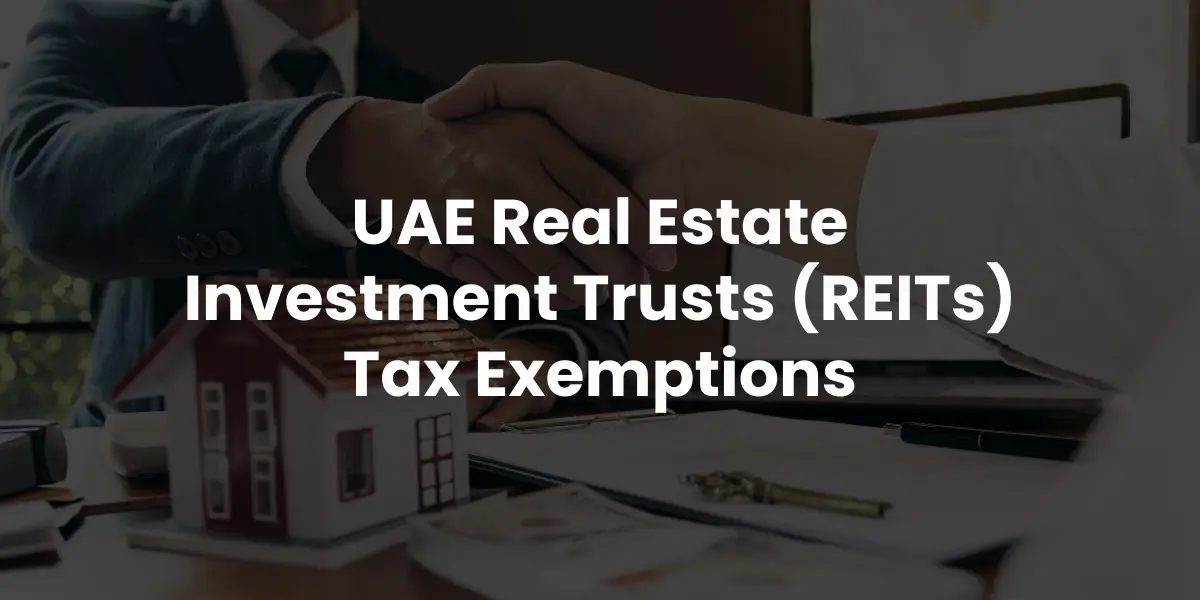
Tax Exemptions Of Real Estate Investment Trusts (REITs) In Dubai
UAE Real Estate Investment Trusts (REITs) Tax Exemptions
As a global financial center, the United Arab Emirates (UAE) has drawn investors from throughout the globe. The UAE Ministry of Finance has established certain requirements for Real Estate Investment Trusts (REITs) to be eligible for corporation tax exemption, which have been included into UAE Federal Law by Cabinet, in keeping with its goal of creating a strong and competitive investment environment. This calculated action is intended to support the real estate industry and give REITs doing business in the United Arab Emirates, such as those based in the Dubai International Financial Centre (DIFC) and the Abu Dhabi Global Market (ADGM), a competitive advantage. This article explores the specific terms and ramifications of this new tax.
General Requirements for Tax Exemption
The exemption framework is based on general requirements that certain other investment funds and REITs registered under Article 10(1) of the previously mentioned Federal Law No. 47 of 2022 must meet. These requirements guarantee that the organizations receiving the tax exemption are transparent, well-regulated, and involved in lawful investment operations.
Licensed Manager or Fund
One of the main requirements for REITs to be eligible for the tax exemption is that the fund or its manager be subject to regulation by a foreign body recognized by the Corporate Tax Law or a competent UAE authority. The REIT’s legitimacy and commitment to good governance standards are improved by this criterion, which guarantees that it works under strict regulatory scrutiny. Maintaining investor confidence and making sure the REIT stays within the moral and legal bounds established by the appropriate authorities depend heavily on regulatory oversight.
Interests that are traded publicly
The interests in the REIT must also be exchanged on a stock exchange in the United Arab Emirates or another foreign stock exchange that is approved by the Corporate Tax Law. As an alternative, the interests ought to be promoted and made broadly accessible to investors. By encouraging openness and market involvement, this requirement makes sure that the REIT is not a closed company but rather one that provides investment options to a wider range of people. Additionally, price discovery and liquidity are facilitated by the public trading of REIT interests, which increases the investment’s appeal to prospective investors.
The Anti-Avoidance
The main goal of the REIT must not be to evade UAE corporate tax in order to prevent abuse of the tax exemption. The goal of this anti-avoidance strategy is to make sure that the tax exemption is utilized for legitimate investment purposes rather than as a way to avoid paying taxes. The UAE’s dedication to upholding an equitable and open tax system while promoting lawful investment activity is demonstrated by the emphasis on anti-avoidance.
Particular Requirements for REITs
The Cabinet Decision lays out certain requirements that REITs must fulfill in addition to the basic requirements in order to be eligible for the corporate tax exemption. These requirements are intended to guarantee that the REITs that are eligible for the tax exemption are sizable, adequately funded, and principally engaged in real estate investments that generate revenue.
- The value of the asset: One crucial requirement is that the REIT’s managed or owned real estate assets (apart from land) must be worth more than AED 100 million. Only large investment vehicles with a significant economic impact are eligible for the exemption thanks to this high criterion. The UAE hopes to draw significant investments that significantly advance the growth of the real estate industry and the overall economy by imposing a high asset value requirement.
- Capital of Shares: The need that at least 20% of the REIT’s share capital be owned by two or more institutional investors or traded publicly on a recognized stock exchange is another crucial requirement. This requirement guarantees a certain amount of institutional or public investment, which is essential to the REIT’s stability and legitimacy. Transparency and governance standards are improved by the intense scrutiny that comes with institutional ownership or public trading. Additionally, it offers a wider range of investors, which may result in more liquidity and capital inflows.
- The Asset Percentage: At least 70% of the REIT’s assets (by value) must be land or real estate assets that generate rental income in order to guarantee that the REIT is primarily focused on real estate investments. This criterion is consistent with REITs’ usual business strategy, which involves investing in real estate assets that generate revenue. The UAE guarantees that the REITs that enjoy the tax exemption be loyal to their primary function and support the expansion of the real estate industry by requiring a significant proportion of real estate assets.
Governance and Internal Regulations
To record their strategy for obtaining and preserving exempt status, REITs might need to revise their internal regulations and governance frameworks. This entails making sure that all requirements are met and getting ready for any audits or reviews that the tax authority may require. REITs can stay free from regulations and negotiate the regulatory environment with the support of strong governance systems and thorough documentation.
Suggested Modifications
A REIT’s capacity to apply for and maintain exempt status should be evaluated in light of any proposed changes to its composition or structure. By taking this proactive stance, REITs can steer clear of unforeseen repercussions that might compromise their tax-exempt status. Maintaining the advantages of the tax exemption requires constant observation and evaluation of the REIT’s adherence to the requirements.
In conclusion
A calculated move to increase the UAE’s appeal as a real estate investment destination is the country’s new tax exemption policy for REITs. The UAE makes sure that only significant, law-abiding, and open investment entities take advantage of the exemption by establishing strict and unambiguous requirements. It is anticipated that this action will draw large investments, strengthen the real estate market, and support the UAE’s overall economic expansion. In addition to helping the UAE realize its goal of becoming a major international financial and investment hub, REITs that satisfy these requirements can use the tax exemption to boost their competitiveness and provide investors with higher returns.
